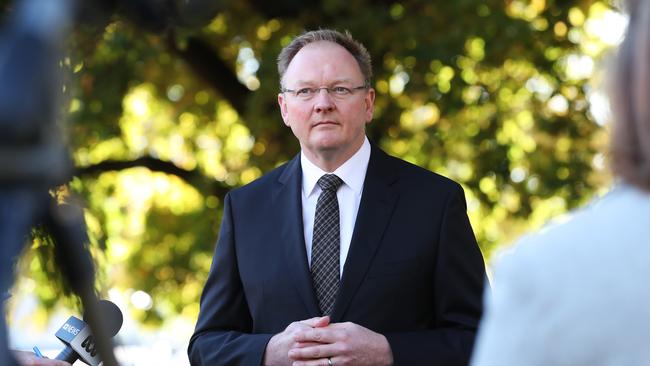Tasmanian Government announces minor changes to Airbnb regulations
THE State Government has tightened regulations around short-stay accommodation — rules that are being mostly ignored and seldom enforced.
Politics
Don't miss out on the headlines from Politics. Followed categories will be added to My News.
THE State Government has tightened regulations around short-stay accommodation — rules that are being mostly ignored and seldom enforced.
Housing Minister Roger Jaensch said there would be a crackdown on Airbnb and similar operations in Battery Point and Wapping.
But critics say the government is simply “tinkering around the edges” and that the city’s wealthiest suburbs have been being ring-fenced — and everyone else ignored — as a housing crisis rages.
New research shows just a quarter of those offering accommodation via the sharing economy have even bothered to get proper permits.
MORE: SHORT-STAY PROPERTY MARKET SOARS
The Tasmanian Planning Commission has reviewed rules surrounding the state’s short-stay accommodation market, and recommended some minor changes, such as reverting to the prohibition of self-contained visitor accommodation in Battery Point and Wapping, introducing further controls on visitor accommodation in strata schemes, and reducing the floor area of properties permitted to offer short stay accommodation from 300sq m to 200sq m.
It is understood the changes to Battery Point visitor accommodation will not be retrospective for properties with a valid permit.
Housing Minister Roger Jaensch said the government believed current regulations delivered a contemporary, pragmatic and balanced approach.
Mr Jaensch said compliance with the regulations was critical to ensure the balance was right.
“We expect those in the short-stay sector to be adhering to the regulations,” he said.
The government says it will begin implementing the changes.

The Commission also found that the conversion of housing stock to short-term visitor accommodation was reducing the availability and affordability of long-term rental properties, but it was outside the scope of the Commission’s review.
“It is evident that the visitor accommodation reforms are a factor in the affordable
housing issues faced by some Tasmanian communities, and the matter needs further
consideration,” the report said.
The Commission is just the latest stakeholder to call on the government to reconsider short-stay accommodation regulations.
University of Tasmania’s Professor Richard Eccleston said research indicated only about a quarter of entire properties in greater Hobart offered on Airbnb were approved under the Government’s new planning scheme, despite Housing Minister Roger Jaensch stating that compliance with government regulations was “critical” for the system to work.
“I think the Government was right to embrace the sharing economy, but we need to get the balance right. Governments right around the world are introducing smart regulations to get the balance right,” Professor Eccleston said.
“Given the housing situation in Hobart in particular, that needs to happen sooner rather than later.”
Professor Eccleston has suggested a cap on the total number of permits that should be issued in inner Hobart to help curb the impact of short-term rentals, rather than a measure such as capping the maximum number of nights a property can be offered, as is being pursued in Sydney by the New South Wales government.
Tourism Industry Council Tasmania chief executive Luke Martin said the current regulation model was “obviously dysfunctional” with only about 60 permits issued by the Hobart City Council so far despite data showing the number of entire homes being offered in the Hobart local government area has risen by 167 per cent to 876.
Mr Martin said the proposed changes would just make the situation more complicated.
“They’re tinkering at the edges, but I do think we need an independent look at what’s the best public policy and planning response to this issue,” Mr Martin said.
“I think it’s bemusing and bizarre they they’ve zeroed in on Battery Point … well you could make the same argument apply for Bruny Island, Binalong Bay, Spring Beach and every other community across the East Coast and around Tasmania that’s grappling with these challenges.”
That sentiment was echoed by TasCOSS chief executive Kym Goodes, who said it was unfortunate that Battery Point — one of Tasmania’s richest suburbs — was “singled out for protection”.
“This is an inequity that means that one community — a community that has the means and capability to object — are responded to. Meanwhile other parts of Tasmania and other Tasmanians’ needs are ignored,” Ms Goodes said.
“We cannot live in a state where social outcomes are determined by objections through a planning commission.”
Shelter Tasmania’s Pattie Chugg said she believed the Commission’s review was too narrow and did not assess the effect of short-term visitor accommodation on the affordability and availability of rental housing.
“It’s not just Battery Point that is experiencing the permanent displacement of residents,” she said.
Labor housing spokesman Josh Willie said the changes did not go far enough to address the housing crisis, labelling the announcement a “missed opportunity”.
Greens leader Cassy O’Connor said the changes would do nothing to improve the shortage of rental accommodation.
The announcement comes just days after the New South Wales government announced new regulations that would cap rentals in greater Sydney where the owners do not live at the property to a maximum of 180 days a year.
Airbnb has been contacted for comment.


